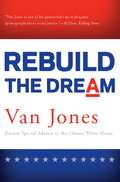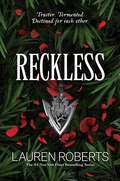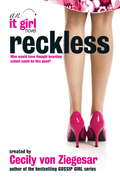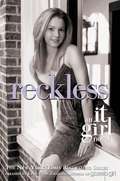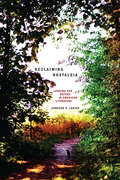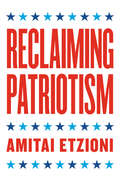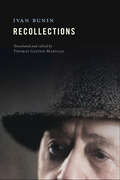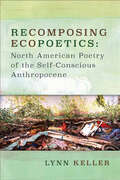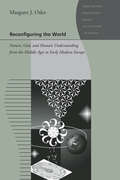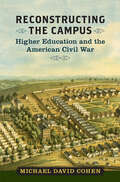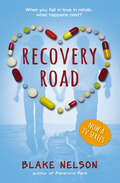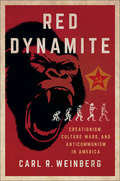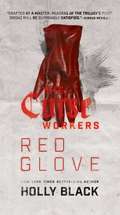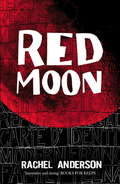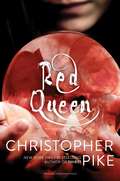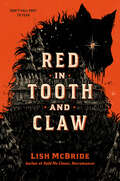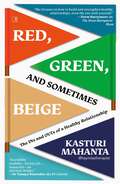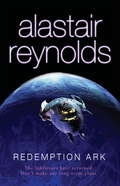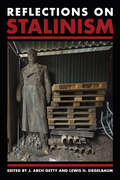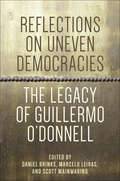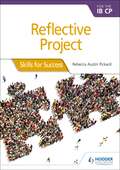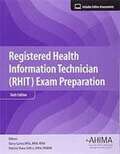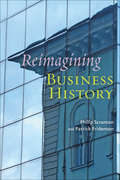- Table View
- List View
Rebuild the Dream
by Van JonesIn the face of Wall Street’s recklessness, Washington’s negligence and the tea parties’ belligerence, President Obama’s former Green Jobs Czar, Van Jones sets forth a bold new manifesto that reclaims the American Dream on behalf of all working Americans
Reckless (The Powerless Trilogy)
by Lauren RobertsPaedyn and Kai battle with duty and desire in this highly anticipated second installment in the sizzling and epic romantic fantasy trilogy that&’s packed with spicy tension and edge-of-your-seat betrayal.The kingdom of Ilya is in turmoil… After surviving the Purging Trials, Ordinary-born Paedyn Gray has killed the King and kickstarted a Resistance throughout the land. Now she&’s running from the one person she had wanted to run to. Kai Azer is now Ilya&’s Enforcer, loyal to his brother Kitt, the new King. He has vowed to find Paedyn and bring her to justice. Across the deadly Scorches, and deep into the hostile city of Dor, Kai pursues the one person he wishes he didn&’t have to. But in a city without Elites, the balance between the hunter and hunted shifts—and the battle between duty and desire is deadly.
Reckless: An It Girl Novel
by Cecily Von ZiegesarJenny was totally enjoying the attention of the three hottest guys on campus. But she's ecstatic now that she's bagged arty Easy Walsh as her boyfriend. Unfortunately he used to belong to someone else...Jenny's roommate: gorgeous, popular Callie Vernon. It doesn't take long for Tinsley to use this to her advantage and soon the girls are split across enemy lines. But all's fair in love and war, and Tinsley better hope that the one secret she's managed to keep hidden for years doesn't get revealed... Who knew boarding school could be this good?
Reckless: An It Girl Novel (It Girl Novel #3)
by Cecily Von ZiegesarWhen Jenny Humphrey arrived at Waverly Academy, the student body immediately started buzzing about her and her body. She quickly caught the eye of three of the hottest guys on campus, kissed two of them, and made one her boyfriend: the adorable Easy Walsh. Too bad Easy just happened to belong to somebody else - Jenny's roommate, Callie Vernon. It didn't take long for powerful Tinsley Carmichael to tell Callie their sweet-faced new roommate was really a manipulative skank. So what if Tinsley herself stole a guy out from under their other roommate Brett Messerschmidt's perky little nose? Then Callie and Tinsley threw Jenny and Brett out of their ultra-exclusive club. And just like that, it was war. Now the four roommates have been split up across enemy lines - Jenny and Callie are living together in Dumbarton 303, and Brett and Tinsley are seemingly miles away downstairs. What will happen when Easy sneaks in to see Jenny . . . but finds Callie instead? And what if Brett discovers the one secret Tinsley's kept hidden for years? Everyone at Waverly is watching and whispering. With girls this wild, anything can happen, but only one can be it.
Reclaiming Nostalgia: Longing for Nature in American Literature (Under the Sign of Nature)
by Jennifer K. LadinoOften thought of as the quintessential home or the Eden from which humanity has fallen, the natural world has long been a popular object of nostalgic narratives. In Reclaiming Nostalgia, Jennifer Ladino assesses the ideological effects of this phenomenon by tracing its dominant forms in American literature and culture since the closing of the frontier in 1890. While referencing nostalgia for pastoral communities and for untamed and often violent frontiers, she also highlights the ways in which nostalgia for nature has served as a mechanism for social change, a model for ethical relationships, and a motivating force for social and environmental justice.
Reclaiming Patriotism
by Amitai EtzioniAmitai Etzioni has made his reputation by transcending unwieldy, and even dangerous, binaries such as left/right or globalism/nativism. In his new book, Etzioni calls for nothing less than a social transformation—led by a new social movement—to save our world’s democracies, currently under threat in today’s volatile and profoundly divided political environments.The United States, along with scores of other nations, has seen disturbing challenges to the norms and institutions of our democratic society, particularly in the rise of exclusive forms of nationalism and populism. Focusing on nations as the core elements of global communities, Etzioni envisions here a patriotic movement that rebuilds rather than splits communities and nations.Beginning with moral dialogues that seek to find common ground in our values and policies, Etzioni sets out a path toward cultivating a "good" form of nationalism based on this shared understanding of the common good. Working to broaden civic awareness and participation, this approach seeks to suppress neither identity politics nor special interests in its efforts to lead us to work productively with others. Reclaiming Patriotism offers a hopeful and pragmatic solution to our current crisis in democracy—a patriotic movement that could have a transformative, positive impact on our foreign policy, the world order, and the future of capitalism.
Recollections (NIU Series in Slavic, East European, and Eurasian Studies)
by Ivan BuninIn this edited translation of famed writer Ivan Bunin's Recollections translator Thomas Gaiton Marullo provides an intimate look at leading political, social, cultural, and literary figures from late imperial Russia, through the First World War and the revolutions of 1905 and 1917 to the birth of the Russian diaspora and the rise of the Soviet state. Through engaging, colorful, and often idiosyncratic vignettes, Bunin (1870–1953) details his admiration for Leo Tolstoy, Anton Chekhov, Sergei Rachmaninov, and Fyodor Chaliapin. He shares his love-hate relationships with Maxim Gorky, Alexei Tolstoy, and Alexander Kuprin. In addition, Marullo's translation reveals Bunin's hatred of avant-gardists, particularly Vladimir Mayakovsky, as well as his thoughts and experiences on war, revolution, and exile. Bunin's work led, in the end, to his bittersweet reception of the Nobel Prize in Literature (1933) in Stockholm, making him the first Russian and the first writer in exile ever to receive this award. Recollections reveals the author's feelings toward this unprecedented event. Bunin's Recollections stands not only as a stark summa of his passage through literature and life but also as an equally bold apologia as to his place in both.
Recomposing Ecopoetics: North American Poetry of the Self-Conscious Anthropocene (Under the Sign of Nature)
by Lynn KellerIn the first book devoted exclusively to the ecopoetics of the twenty-first century, Lynn Keller examines poetry of what she terms the "self-conscious Anthropocene," a period in which there is widespread awareness of the scale and severity of human effects on the planet. Recomposing Ecopoetics analyzes work written since the year 2000 by thirteen North American poets--including Evelyn Reilly, Juliana Spahr, Ed Roberson, and Jena Osman--all of whom push the bounds of literary convention as they seek forms and language adequate to complex environmental problems. Drawing as often on linguistic experimentalism as on traditional literary resources, these poets respond to environments transformed by people and take "nature" to be a far more inclusive and culturally imbricated category than conventional nature poetry does. This interdisciplinary study not only brings cutting-edge work in ecocriticism to bear on a diverse archive of contemporary environmental poetry; it also offers the environmental humanities new ways to understand the cultural and affective dimensions of the Anthropocene.
Reconfiguring the World: Nature, God, and Human Understanding from the Middle Ages to Early Modern Europe (Johns Hopkins Introductory Studies in the History of Science)
by Margaret J. OslerChange in human understanding of the natural world during the early modern period marks one of the most important episodes in intellectual history. This era is often referred to as the scientific revolution, but recent scholarship has challenged traditional accounts. Here, in Reconfiguring the World, Margaret J. Osler treats the development of the sciences in Europe from the early sixteenth to the late seventeenth centuries as a complex and multifaceted process.The worldview embedded in modern science is a relatively recent development. Osler aims to convey a nuanced understanding of how the natural world looked to early modern thinkers such as Galileo, Descartes, Boyle, and Newton. She describes investigation and understanding of the natural world in terms that the thinkers themselves would have used. Tracing the views of the natural world to their biblical, Greek, and Arabic sources, Osler demonstrates the impact of the Renaissance recovery of ancient texts, printing, the Protestant Reformation, and the exploration of the New World. She shows how the traditional disciplinary boundaries established by Aristotle changed dramatically during this period and finds the tensions of science and religion expressed as differences between natural philosophy and theology.Far from a triumphalist account, Osler’s story includes false starts and dead ends. Ultimately, she shows how a few gifted students of nature changed the way we see ourselves and the universe.
Reconstructing the Campus: Higher Education and the American Civil War (A Nation Divided)
by Michael David CohenThe Civil War transformed American life. Not only did thousands of men die on battlefields and millions of slaves become free; cultural institutions reshaped themselves in the context of the war and its aftermath. The first book to examine the Civil War’s immediate and long-term impact on higher education, Reconstructing the Campus begins by tracing college communities’ responses to the secession crisis and the outbreak of war. Students made supplies for the armies or left campus to fight. Professors joined the war effort or struggled to keep colleges open. The Union and Confederacy even took over some campuses for military use. Then moving beyond 1865, the book explores the war’s long-term effects on colleges. Michael David Cohen argues that the Civil War and the political and social conditions the war created prompted major reforms, including the establishment of a new federal role in education. Reminded by the war of the importance of a well-trained military, Congress began providing resources to colleges that offered military courses and other practical curricula. Congress also, as part of a general expansion of the federal bureaucracy that accompanied the war, created the Department of Education to collect and publish data on education. For the first time, the U.S. government both influenced curricula and monitored institutions.The war posed special challenges to Southern colleges. Often bereft of students and sometimes physically damaged, they needed to rebuild. Some took the opportunity to redesign themselves into the first Southern universities. They also admitted new types of students, including the poor, women, and, sometimes, formerly enslaved blacks. Thus, while the Civil War did great harm, it also stimulated growth, helping, especially in the South, to create our modern system of higher education.
Recovery Road
by Blake NelsonNOW A TV SERIES ON FREEFORM"An intriguing look at the aftermath of addiction." --Los Angeles TimesMadeline has a drinking problem and anger issues, so she's sent away to Spring Meadows, a rehab center in a row of rehab centers known as Recovery Road. On a weekly movie night in town she meets Stewart, who's dealing with demons of his own. It's an intense time, and the two of them come together intensely.When Madeline gets out of rehab, she tries to get back on her feet, and waits for Stewart to join her. When he does, though, it's not the ideal reunion that Madeline has dreamed of. Both of them still have serious problems. And love seems more like a question than an answer.True and insightful, Recovery Road is a story about finding the right person at the worst possible time. And loving that person anyway. No matter what.
Red Dynamite: Creationism, Culture Wars, and Anticommunism in America (Religion and American Public Life)
by Carl R. WeinbergIn Red Dynamite, Carl R. Weinberg argues that creationism's tenacious hold on American public life depended on culture-war politics inextricably embedded in religion. Many Christian conservatives were convinced that evolutionary thought promoted immoral and even bestial social, sexual, and political behavior. The "fruits" of subscribing to Darwinism were, in their minds, a dangerous rearrangement of God-given standards and the unsettling of traditional hierarchies of power. Despite claiming to focus exclusively on science and religion, creationists were practicing politics. Their anticommunist campaign, often infused with conspiracy theory, gained power from the fact that the Marxist founders, the early Bolshevik leaders, and their American allies were staunch evolutionists. Using the Scopes "Monkey" Trial as a starting point, Red Dynamite traces the politically explosive union of Darwinism and communism over the next century. Across those years, social evolution was the primary target of creationists, and their "ideas have consequences" strategy instilled fear that shaped the contours of America's culture wars. By taking the anticommunist arguments of creationists seriously, Weinberg reveals a neglected dimension of antievolutionism and illuminates a source of the creationist movement's continuing strength. Thanks to generous funding from Indiana University and its participation in TOME (Toward an Open Monograph Ecosystem), the ebook editions of this book are available as Open Access volumes from Cornell Open (cornellpress.cornell.edu/cornell-open) and other repositories.
Red Glove: White Cat; Red Glove; Black Heart (The Curse Workers #2)
by Holly BlackThe cons get twistier and the stakes get higher in this second book of The Curse Workers trilogy: “a sleek and stylish blend of urban fantasy and crime noir” (Booklist).Curses and cons. Magic and the mob. In Cassel Sharpe’s world, they go together. Cassel always thought he was an ordinary guy, until he realized his memories were being manipulated by his brothers. Now he knows the truth—he’s the most powerful curse worker around. A touch of his hand can transform anything—or anyone—into something else. After rescuing his brothers from Zacharov’s retribution and finding out that Lila will never be his, Cassel is trying to reestablish some kind of normalcy in his life. That was never going to be easy for someone from a worker family tied to one of the big crime families, and a mother whose cons get more reckless by the day. But Cassel is also coming to terms with what it means to be a transformation worker and figuring out how to have friends. But normal doesn’t last very long—soon Cassel is being courted by both sides of the law and is forced to confront his past. A past he remembers only in scattered fragments and one that could destroy his family and his future. Cassel will have to decide whose side he wants to be on because neutrality is not an option. And then he will have to pull off his biggest con ever to survive. Love is a curse and the con is the only answer in a game too dangerous to lose.
Red Moon
by Rachel AndersonHamish is sensible, conscientious, and respectable, friends with the good boys, stays away from the bad ones. When his father is murdered in an act of random violence, Hamish's world turns upside down. Angry and alienated, Hamish begins to lose his tolerant beliefs and is drawn towards racist reactions.A move to France promises a much needed new beginning, but only builds Hamish's new attitudes as he becomes embroiled in the narrow-minded views of the locals. But then a boat of north-african refugees founders on the coast and Hamish encounters the sole survivor. Now his world is turned upside down again, caught between the violence of his past experiences and new realities unfolding in front of him.
Red Queen (Witch World #1)
by Christopher PikeWitches are real—and each of us may be one—in this all-new paranormal suspense novel from #1 New York Times bestselling author Christopher Pike.Heading off for a weekend in Las Vegas with her friends, Jessie Ralle has only one worry—how to make it through the road trip in the same car with her Ex, Jimmy Kelter. The guy who broke her heart five months ago when he dumped her for no reason. The guy who’s finally ready to tell her why he did it, because he wants her back. But what Jessie doesn’t realize is that Jimmy is the least of her problems. In Las Vegas she meets Russ, a mesmerizing stranger who shows her how to gamble, and who never seems to lose. Curious, Jessie wants to know his secret, and in response, alone in his hotel room, he teaches her a game that opens a door to another reality. To Witch World. Suddenly Jessie discovers that she’s stumbled into a world where some people can do the impossible, and others may not even be human. For a time she fears she’s lost her mind. Are there really witches? Is she one of them? #1 Bestselling author Christopher Pike offers up another classic edge-of-your-seat thrill ride that keeps you guessing right until the last page.
Red in Tooth and Claw
by Lish McBrideA dark young adult Western fantasy about a teen in a remote settlement full of monsters and secrets."In this eerie, blood-splashed Western, Lish McBride invokes a frontier that is harsh, cruel, and practical...A damned enjoyable novel." —Kendare Blake, #1 New York Times bestselling author of Three Dark CrownsFaolan Kelly&’s grandfather is dead. She&’s alone in the world and suddenly homeless, all because the local powers that be don&’t think a young man of sixteen is mature enough to take over his grandfather&’s homestead…and that&’s with them thinking Faolan is a young man. If she revealed that her grandfather had been disguising her for years, they would marry her off at the first opportunity.The mayor finds a solution that serves everyone but Faolan: He hires a gunslinger to ship her off to the Settlement, a remote fort where social outcasts live under the leadership of His Benevolence Gideon Dillard. It's a place rife with mystery, kept afloat by suspicious wealth. Dillard's absolute command over his staff just doesn't seem right. And neither do the strange noises that keep Faolan up at night.When Faolan finds the body of a Settlement boarder, mangled by something that can&’t possibly be human, it&’s clear something vicious is stalking the palisades. And as Settlement boarders continue to drop like flies, Faolan knows she must escape to evade the creature&’s wrath.
Red, Green, and Sometimes Beige: The Ins and Outs of a Healthy Relationship
by Kasturi MahantaOh, that&’s such red-flag behaviour. My love language is physical touch but hers is words of affirmation. But I have an anxious attachment style, I need frequent validation. Sound familiar? If you&’ve been on the internet, chances are you&’ve definitely heard of flags, trauma bonds, and attachment styles. But what do they even mean? Relationship Coach Kasturi Mahanta explains the common troubles plaguing our relationships from a therapist&’s perspective. Through fictionalised accounts of problems she has coached people through, she explains the hows and the whys behind people&’s behaviours, especially in romantic relationships—whether it be coping mechanisms, anger, or the invisible emotional labour a partner performs. Armed with exercises for readers to participate in, these chapters help us not only identify certain patterns and behaviours—in our partners and ourselves—but also delve into why they might occur. It aims to equip readers with a better understanding of the root causes of problems so that we may build and ultimately stay in healthy, long-term relationships
Red: A Novel
by Annie CardiA Christian girl is stigmatized by her peers after seeking an abortion in this modern retelling of The Scarlet Letter for the #MeToo era. Moving to Hawthorne was something Tess and her mom never anticipated, but after Tess&’s mom loses her job, it&’s their only option. Tess&’s grandparents welcome them into their home, on the condition that Tess and her mom attend church, something Mom isn&’t too pleased about. But Tess enjoys the church community, finding a place in youth group and the church choir. Faith fills a void Tess didn&’t know she had. After a very personal decision goes public, Tess faces daily harassment and rejection by her former friends, and singing in the church choir is no longer an option. When she meets some kids in the music room, her only place of solace in the school, she finds they don't judge her for what's happened, and she learns to find her voice again. Against the backdrop of the Spirit Light Festival, Tess will need to find the strength to speak out if she is to have any chance of ending a silent cycle of abuse in Hawthorne. Perfect for fans of YA books like Speak, by Laurie Halse Anderson, or Exit, Pursued by a Bear, by E. K. Johnston, Red is a timely and relevant young adult novel about finding your voice and rising above shame. Anyone looking for teen girl books that explore the complex themes of reproductive rights, religious hypocrisy, and overcoming adversity will appreciate this story of judgment and redemption.
Redemption Ark (The\inhibitor Trilogy Ser. #2)
by Alastair ReynoldsThe Inhibitors are back and Humanity is doomed!Many, many millennia ago, the Inhibitors seeded the universe with machines designed to detect intelligent life - and then to suppress it. But after hundreds of millions of years, the machines started to fail and intelligent cultures started to emerge.Then Dr Dan Sylveste and the crew of Infinity discovered what had happened to the long-vanished Amarantin race ... and awakened the Inhibitors.On Yellowstone, where no one is quite who they appear, the Inquisitor and the planet's Most Wanted War Criminal are watching as the Inhibitors turn a small group of planets into raw materials. Whatever they are building with those materials is not going to be good for Humanity.Once again, Al Reynolds has produced a stunning, universe-spanning space opera of mind-blowing proportions. Big in size, big in concepts, REDEMPTION ARK will leave you gasping at its audacity and breathless at its conclusion.This is British SF at its absolute best.
Reflections on Stalinism (NIU Series in Slavic, East European, and Eurasian Studies)
by J. Arch Getty and Lewis H. SiegelbaumReflections on Stalinism distills decades of historical thought and research, bringing together twelve senior scholars of Soviet history who began their careers during the Cold War to examine their views of Stalinism. They present insights into the role of personality in statecraft, the social underpinnings of dictatorship and state terrorism, historians' attachments to their subjects, historical causality, the applicability of Marxist categories to Soviet history, the relationship of Soviet history to post-Soviet Russia, and more. Essays address the transformation of a peasant country into a superpower and the causes and scale of domestic bloodshed. Reflections on Stalinism ultimately tackles an age-old question: Do powerful people make history or are they the product of it?
Reflections on Uneven Democracies: The Legacy of Guillermo O'Donnell
by Daniel BrinksA tour-de-force analysis of the current state of democracy studies as seen through the scholarly legacy of Guillermo O’Donnell.Winner of the CHOICE Outstanding Academic Title of the Choice ACRLThe third wave of democratization produced a wealth of enduring social science. Beginning in the 1970s, it prompted scholars to develop important theories on authoritarian breakdowns and transitions to democracy. No one in the field was more influential than Guillermo O’Donnell (1936–2011), whose pathbreaking work shaped the scholarship of generations of social scientists. Reflections on Uneven Democracies honors the legacy of O’Donnell’s research by advancing debates related to his work on democracy. Drawing together a veritable Who’s Who of eminent scholars—including two of O’Donnell’s closest collaborators, Philippe Schmitter and Laurence Whitehead—the volume examines issues related to democratic breakdowns and stability, the nature and quality of new democracies, institutional strength, the rule of law, and delegative democracy.This reexamination of some of the most influential arguments about democracy of the past forty years leads to original approaches and insights for a new era of democracy studies. Students of democracy and institutional performance, both Latin Americanists and comparativists more generally, will find this essential reading.
Reflective Project for the IB CP: Skills for Success
by Rebecca Austin PickardSupport students through their Reflective Project with this practical companion, fullof advice and guidance that will help develop strong thinking, research and communication skills- Build confidence through expert guidance that focuses on a range of skills:developing a clear ethical issue, developing a research question, thinking critically,referencing and citing sources clearly and reviewing the final project.- Navigate the lB requirements with clear, concise explanations, including advice onassessment objectives and academic honesty.- Develop fully rounded and responsible learning with explicit reference to the ISlearner profile.- Support visual learners with an infographic at the start of each chapter laying out thekey points that will be addressed.- Provide guidance on the importance of reflection with tips on managing theResearcher's reflective space (RRS) and completing the Reflections on planning andprogress form (RPPF).
Registered Health Information Technician (RHIT) Exam Preparation Sixth Edition
by Darcy Carter Patricia ShawConfidently prepare for the RHIT exam with Registered Health Information Technician (RHIT) Exam Preparation. The exam experience is simulated in this textbook with 850 multiple choice questions, including two complete practice exams based on the RHIT competency statements. Whether you're still learning or ready to test your skills immediately, RHIT Exam Preparation will help prepare you for exam day.
Reichel's Care of the Elderly: Clinical Aspects of Aging (6th Edition)
by William Reichel Christine Arenson Jan Busby-Whitehead Kenneth Brummel-Smith James G. O'Brien Mary H. PalmerThe sixth edition of Reichel's Care of the Elderly: Clinical Aspects of Aging remains the pioneering text for the practicing physician confronted with the unique problems of an increasingly elderly population. Dr. William Reichel's formative text is designed as a practical and useful guide for all levels of geriatric care, from medical students to geriatric specialists. This book emphasizes clinical management and addressed problems from the simple to the highly complex. The renowned editors have revised every chapter and have included the most recent advances in elderly care. New chapters include hormonal therapy in post-menopausal women, drug therapy for Alzheimer's sufferers, alternative medicine, the chronic understaffing of nursing homes, management of delirium, and ethical issues. Comprehensive and written for any clinicians caring for older patients (including family physicians, general internists, nurse practitioners, geriatricians, and other specialists), this esteemed text provides practical and trusted advice.
Reimagining Business History
by Philip Scranton Patrick FridensonA vigorous call for rethinking the field of business history.Business history needs a shake-up, Philip Scranton and Patrick Fridenson argue, as many businesses go global and cultural contexts become critical. Reimagining Business History prods practitioners to take new approaches to entrepreneurial intentions, company scale, corporate strategies, local infrastructure, employee well-being, use of resources, and long-term environmental consequences.During the past half century, the history of American business became an unusually active and rewarding field of scholarship, partly because of the primacy of postwar American capital, at home and abroad, and the rise of a consumer culture but also because of the theoretical originality of Alfred D. Chandler. In a field long given over to banal company histories and biographies of tycoons, Chandler took the subject seriously enough to ask about the large patterns and causes of corporate success. Chandler and his students found the richest material for theorizing about the course of business history in large companies and their institutional structures and cultures. Meantime, Scranton and others found smaller firms, those specializing in batch work as opposed to mass-produced goods, far closer to the norm and more telling.Scranton and Fridenson believe that the time has come for a sweeping rethinking of the field, its materials, and the kinds of questions its practitioners should be asking. How can this field develop in an age of global markets, growing information technology, and diminishing resources? A transnational collaboration between two senior scholars, Reimagining Business History offers direction in forty-four short, pithy essays.
